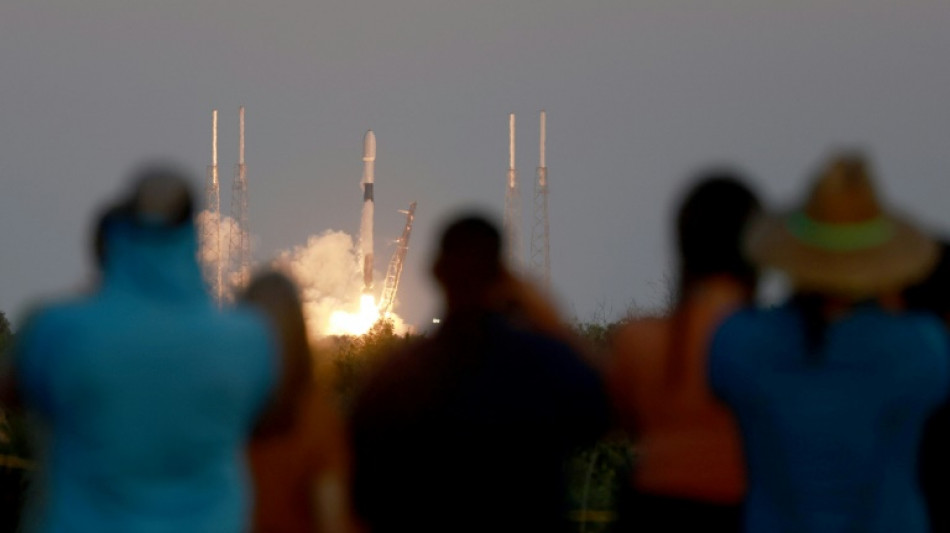
-
 Israel says killed spokesman for Hamas armed wing
Israel says killed spokesman for Hamas armed wing
-
Ireland on verge of Women's Rugby World Cup quarter-finals after seeing off stubborn Spain

-
 Vardy set to complete move to Serie A side Cremonese: source
Vardy set to complete move to Serie A side Cremonese: source
-
Japan's Yamaguchi cruises to third badminton world title

-
 Jackson hopes to revive Bayern move after Chelsea halt loan deal
Jackson hopes to revive Bayern move after Chelsea halt loan deal
-
Floods leave women struggling in Pakistan's relief camps
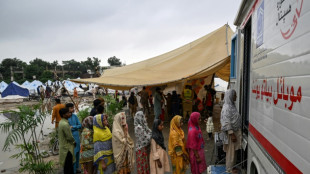
-
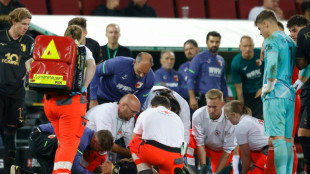 Augsburg's Fellhauer leaves hospital after concussion against Bayern
Augsburg's Fellhauer leaves hospital after concussion against Bayern
-
Man Utd stars back Amorim says De Ligt

-
 Indonesia leader says some protests 'leaning towards treason, terrorism'
Indonesia leader says some protests 'leaning towards treason, terrorism'
-
Springboks call up De Klerk for New Zealand tour
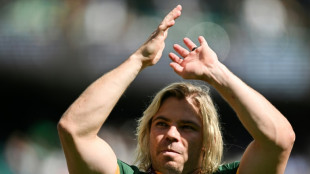
-
 Indonesian finance minister's home looted as protest anger grows
Indonesian finance minister's home looted as protest anger grows
-
Indonesia protests put spotlight on paramilitary police force

-
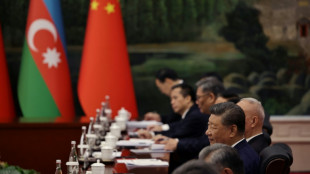 Putin and Modi in China for summit hosted by Xi
Putin and Modi in China for summit hosted by Xi
-
Britain's energy grid bets on flywheels to keep the lights on
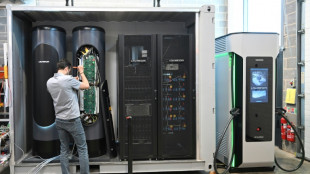
-
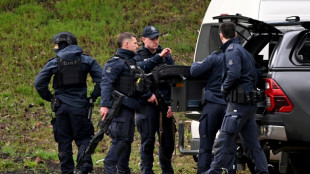 Wife of Australian man wanted in police killings urges him to surrender
Wife of Australian man wanted in police killings urges him to surrender
-
Indonesian islanders taking Swiss concrete giant to court over climate

-
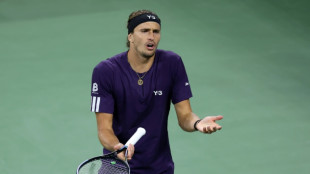 Zverev knocked out in US Open third round
Zverev knocked out in US Open third round
-
Aid flotilla with Greta Thunberg set to sail for Gaza

-
 French foreign minister expresses 'solidarity' on Greenland trip
French foreign minister expresses 'solidarity' on Greenland trip
-
Tourists dice with danger on Hanoi's train street

-
 Pacifist Japan struggles to boost troops as China anxiety grows
Pacifist Japan struggles to boost troops as China anxiety grows
-
In Guyana, remote dirt road seen as future economic lifeline

-
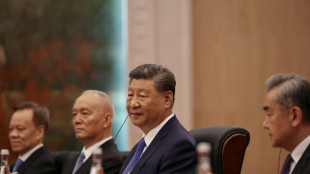 Putin lands in Tianjin for summit hosted by China
Putin lands in Tianjin for summit hosted by China
-
Sinner, Swiatek tested at US Open as Gauff sets up Osaka showdown
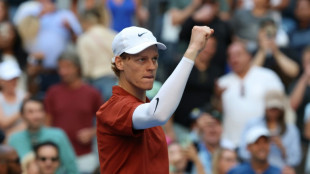
-
 Swiatek struggles into US Open fourth round
Swiatek struggles into US Open fourth round
-
Olympic champion Hassan and Kiros smash course records to win Sydney Marathon

-
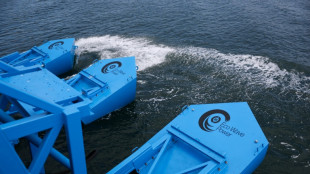 New wave: Sea power turned into energy at Los Angeles port
New wave: Sea power turned into energy at Los Angeles port
-
China's Wang grabs three-shot LPGA lead at TPC Boston

-
 Hassan and Kiros smash race records to win Sydney Marathon
Hassan and Kiros smash race records to win Sydney Marathon
-
Mitchell wants more from England at World Cup after another huge win

-
 Real Madrid overturn Mallorca as Atletico held
Real Madrid overturn Mallorca as Atletico held
-
Sinner tested at US Open as Gauff cruises into last 16
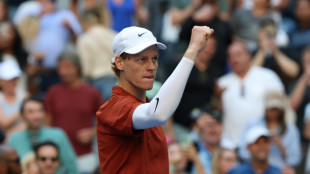
-
 Joao Neves bags stunning hat-trick as PSG put six past Toulouse
Joao Neves bags stunning hat-trick as PSG put six past Toulouse
-
Real Madrid make Mallorca comeback to maintain perfect start

-
 Wong's US Open dream over after Rublev thriller
Wong's US Open dream over after Rublev thriller
-
Last-gasp Anguissa fires Napoli past Cagliari, Roma keep pace

-
 Sinner repels Shapovalov to reach US Open last 16
Sinner repels Shapovalov to reach US Open last 16
-
In Argentina, the tango keeps Parkinson's symptoms at bay

-
 Shi sets up badminton world final with Kunlavut, women's champion An falls
Shi sets up badminton world final with Kunlavut, women's champion An falls
-
Igamane hits debut double for seven-goal Lille

-
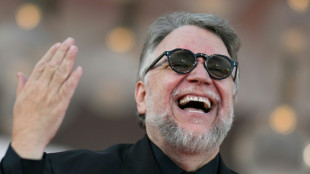 Del Toro delivers his monster, 'Frankenstein', at Venice
Del Toro delivers his monster, 'Frankenstein', at Venice
-
Osaka sinks Kasatkina to reach US Open last 16

-
 Bayern survive late Augsburg scare, Ten Hag's tough start continues
Bayern survive late Augsburg scare, Ten Hag's tough start continues
-
NFL Cowboys linebacker legend Jordan dead at 84

-
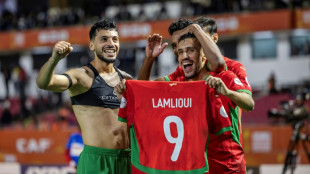 Lamlioui double fires Morocco to record third CHAN title
Lamlioui double fires Morocco to record third CHAN title
-
Chelsea sign Garnacho from Man Utd

-
 Spurs fans right to boo after Bournemouth defeat: Frank
Spurs fans right to boo after Bournemouth defeat: Frank
-
Gauff cruises at US Open as Sinner targets last 16
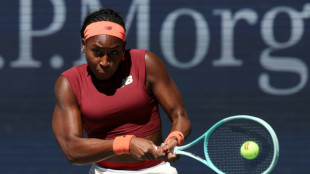
-
 Simeone's stuttering Atletico draw at Alaves
Simeone's stuttering Atletico draw at Alaves
-
Smiling Gauff romps into US Open last 16
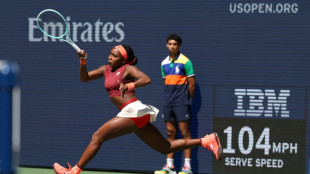

Satellite constellations multiply on profit hopes, geopolitics
The massive constellation of satellites operated by SpaceX, while still growing, will soon be joined in low Earth orbit by many more commercial competitors, but also government-sponsored programs.
When firms floated the idea of expanding access to high-speed internet through satellite constellations in low Earth orbit (LEO), analysts expected only two or three companies would succeed.
"But the number of players keeps growing," Caleb Henry, research director at Quilty Analytics, told AFP at the annual SATELLITE conference in Washington.
He said there are now at least eight companies vying to launch or complete their LEO constellations, including early entrants SpaceX and OneWeb, which could see a ballooning number of objects in orbit.
Amazon alone hopes to launch over 3,200 satellites as part of its stealthy "Kuiper" project.
But governments are also keen to join the rush.
China plans to launch 13,000 satellites as part of its GuoWang constellation, while Canada's Telesat will add 300 and German start-up Rivada is eyeing 600.
That will be in addition to the European Union's Iris project -- 170 satellites -- and the 300-500 satellites planned to be launched by the US military's Space Development Agency.
When it comes to the satellite constellation game, "people underestimated how sovereign interests would get involved," Henry said.
- Sustainability in space -
While around 120 satellites were launched in all of 2012, in just the first two months of this year, almost 380 were put into orbit.
The total number of LEO satellites should rise to about 24,500 over the next decade, with more than half of them for the three largest constellations, according to forecasts by Euroconsult.
Henry believes there is an open question over how the market will digest all this added capacity.
Mark Dankberg, president of satellite communications firm Viasat -- which operates in the much higher geostationary orbit -- -- said he would be interested in entering the LEO market, but doesn't want big players in the space industry to crowd out competitors.
"We’re interested in LEO, the thing we’re concerned about is leaving enough competition in the market," Dankberg said.
He also warned about the issue of sustainability -- with so many objects in orbit, risks increase of collisions, spreading debris, and frequencies becoming overloaded.
The largest player by far in LEO is Elon Musk's SpaceX, which has already launched nearly 3,600 satellites and in December received authorization to deploy 7,500 of its planned 30,000-satellite second generation constellation.
- Ukraine gas pedal -
Starlink's one million customers is still second place to the lesser-known Hughes, also a US-based operator but whose satellites, like Viasat, are much larger and fly in geostationary orbit.
Oneweb, the British operator in the process of being acquired by Eutelsat, completed its penultimate launch in early March and is expected to have completed its 650-satellite constellation by the end of the month.
The head of Amazon's Kuiper project, Dave Limp, said they will launch their first two prototypes in May and are "on schedule to have over half of our constellation up by mid-2026," a requirement to keep its rights to certain frequencies.
But when it comes to government-sponsored projects, such as the EU's Iris, "commercial utility comes second."
"The idea is... working together on defense," Henry said of Iris.
He attributes the newfound momentum behind the project to the war in Ukraine, where Starlink has been used by Kyiv's forces and civilians to stay connected despite strikes to the country's telecom infrastructure.
M.Odermatt--BTB


